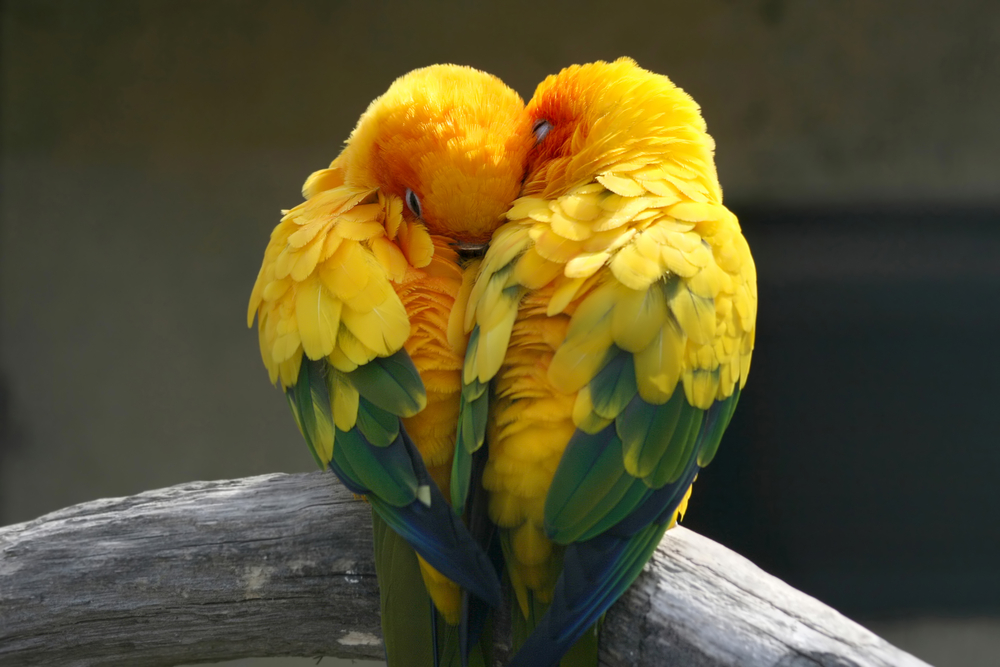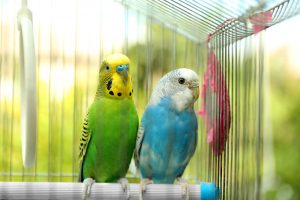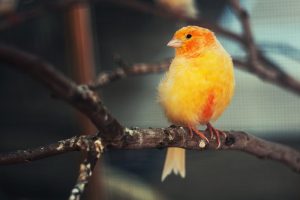 Whether budgie, parrot, canary or other birds, bird owners have a high responsibility to their pets and should always be aware of it. This applies to their keeping, for example the size of their cage, that they get enough time to fly freely, are not kept solitary and have a clean cage. Their nutrition is another important point as well and should not be taken lightly. It is not enough to only feed them cheap bird food from the supermarket. Birds need different vitamins to stay healthy and feel well. This article will explain to you which kinds of vitamins your bird needs.
Whether budgie, parrot, canary or other birds, bird owners have a high responsibility to their pets and should always be aware of it. This applies to their keeping, for example the size of their cage, that they get enough time to fly freely, are not kept solitary and have a clean cage. Their nutrition is another important point as well and should not be taken lightly. It is not enough to only feed them cheap bird food from the supermarket. Birds need different vitamins to stay healthy and feel well. This article will explain to you which kinds of vitamins your bird needs.
Contents
- 1 What happens if a bird does not get any or too little vitamins?
- 1.1 How to recognize a vitamin deficiency
- 1.2 How to prevent vitamin deficiency
- 1.3 Which products contain the vitamins?
- 1.4 Vitamins are needed for these reasons:
- 1.5 What to do in case of vitamin deficiency
- 1.6 What is the prognosis for an already existing vitamin deficiency?
- 1.7 Ask your veterinarian
- 1.8 Additional food contents for your birds
What happens if a bird does not get any or too little vitamins?
 Birds are prone to vitamin deficiency, which can be fatal in the worst case. Vitamin A, D (often together with a calcium deficiency) and B deficiency are the most common ones but lots of other vitamins have to be supplied as well. A deficiency occurs if a bird does not ingest enough vitamins through its food.
Birds are prone to vitamin deficiency, which can be fatal in the worst case. Vitamin A, D (often together with a calcium deficiency) and B deficiency are the most common ones but lots of other vitamins have to be supplied as well. A deficiency occurs if a bird does not ingest enough vitamins through its food.
Vitamin A deficiency
Birds suffering from vitamin A deficiency are often helpless against diseases since their own immune system is immensely weakened. Furthermore it can be disastrous to reproduction, bone growth and respiratory tracts. If the deficiency is strong enough, your bird may suffer from colds or have difficulty in breathing. Parrots often suffer from different kinds of fungal infections, for example aspergillosis.
Vitamin D deficiency
Vitamin D is important for the birds’ bones, so when a deficiency occurs, the skeleton may be damaged. So it is important for them to be supplied with enough vitamin D and enough sunlight, so the vitamin can be produced.
Vitamin B and E deficiency
A deficiency of these two vitamins may lead to cramps. Different kinds of neurological failures may occur as well, so the bird may even suffer from paralysis.
How to recognize a vitamin deficiency
Many bird owners are unsure whether their pets are sufficiently supplied with vitamins or not. There are symptoms you can look out for that point to a vitamin deficiency.
You can see them in this table:
| Type of deficiency | Typical symptoms |
| Vitamin A deficiency
|
|
| Vitamin D, E or selenium deficiency |
|
| Vitamin D, calcium deficiency |
|
How to prevent vitamin deficiency
It is important to constantly supply your bird with the important vitamins, so a deficiency can not occur in the first place. You can do this by supplying a balanced diet containing only high-quality nutrition. The cage should be placed in a sunny place and your bird should have enough space.
When choosing the right food you should consider that it has been especially customized for your bird species. There are specialized foods for budgies, parrots, and so on.
Besides a food, there are other options for a vitamins’ supply, for example specialized calcium stones which should be freely accessible inside the bird’s cage. Chickweed from your garden also contains many important vitamins.
Vitamins at a glance and where to find them
Vitamins are essential to your bird’s health and should always be sufficiently supplied. Most bird species can only produce vitamin C and D by themselves.
This means the other vitamins need to be ingested through food. These can be split into lipo- and water-soluble substances. How many and what kind of vitamins are needed is dependent on the respective species, so you should inform yourself which vitamins should be fed and in which amounts, since not only too few vitamins are dangerous but also too many.
A higher amount is needed when the birds are still growing or hatching, so feeding synthetic vitamins may make sense in these situations.
Liposoluble vitamins
Vitamin A
Vitamin A is only contained in food from animal sources, so your birds can only ingest it directly by feeding on chicken yolks. Many plants however contain the so-called pro-vitamin A or carotin. From these elements, your bird can produce vitamin A by itself.
Vitamin D
To be exact this is the vitamin D group, consisting of D2, D3 and the pro-vitamin 7-dehydrocholesterol, which is also known as the precursor to the important cholesterol. This is transformed beneath the skin to pre-vitamin D3 and vitamin D3. For this process, UV light is very important.
Vitamin E
Birds generally need more vitamin E than mammals. This vitamin is stored in the lung, liver, fat tissue and spleen. There are eight different kinds of vitamin E but only alpha tocopherol is important for birds.
Vitamin K
Vitamin K occurs as K1 and K2. K2 is produced in the birds’ intestine by microorganisms and is ingested through the birds’ feces. K1 has to be supplied by an external source. This vitamin is stored in the liver and is essential for blood coagulation.
Water-soluble vitamins
Water-soluble vitamins cannot be stored by your birds, so there is no danger of overdose. For this reason it is important to constantly supply these vitamins in order to prevent deficiency.
Vitamin B1
Vitamin B1 is especially sensitive and is easily destroyed by too much light, warmth or air.
Vitamin B2
Vitamin B2 is also known as the growth vitamin and part of many different enzymes. Furthermore vitamin B2 is responsible for building and dismantling of fatty acids.
Vitamin C
Vitamin C is contained in many different plants, fruits and the birds’ food and should be supplied on a satisfactory level. If your bird is sick or stressed, you should especially look out for the food’s vitamin C levels or support it by adding synthetic vitamin compounds.
Which products contain the vitamins?
The following table offers a good overview of the most important vitamins and in which products to find them, so you can supply your bird adequately.
| Vitamin | What food contains it? |
| Vitamin A
|
|
| Vitamin D
|
|
| Vitamin E
|
|
| Vitamin K |
|
| Vitamin B1
|
|
| Vitamin B2
|
|
| Vitamin C |
|
Vitamins are needed for these reasons:
Vitamin A:
- protection of the skin
- protection of the mucous membranes
- supporting growth (higher dose of vitamin A is needed)
Vitamin D
- regulates a calcium-phosphate metabolism
- preserves a bone structure
- important for growing eggs
- prevents egg binding
Vitamin E
- protects the liposoluble vitamins
- protects the unsaturated fatty acids
- enhances vitamin A’s effect
- important for the muscles
Vitamin B1
- important for a carbohydrate metabolism
- important for the nervous system
Vitamin B2
- important for the growth
- important for the feathers
Vitamin C
- strengthens the immune system
- important when bird is sick
- important when bird is stressed
- influences a cell respiration
- influences a hormonal balance
- important for a bone growth
- important for a blood formation
What to do in case of vitamin deficiency
 If your bird suffers from a vitamin deficiency discussed above, you have to react promptly and quickly. It depends on how advanced the symptoms are and thus how big the deficiency is. Missing vitamins are now given to the bird. Depending on the deficiency, your veterinarian will inject the missing vitamins directly in a high dose or supply them via food and/or water.
If your bird suffers from a vitamin deficiency discussed above, you have to react promptly and quickly. It depends on how advanced the symptoms are and thus how big the deficiency is. Missing vitamins are now given to the bird. Depending on the deficiency, your veterinarian will inject the missing vitamins directly in a high dose or supply them via food and/or water.
It is also important to analyze why the deficiency has appeared, so you can adjust your bird’s diet. You should watch out not to overdose the respective vitamins, since that may also be damaging to its health.
Furthermore symptoms are looked at and treated. The veterinarian may for example inject a remedy for cramps and stabilize the bird by applying various infusions.
How you keep your bird is also important information for your veterinarian. A vitamin D deficiency occurs mostly when they do not get enough UV light. It is important to know that direct sunlight is necessary, UV light is destroyed by windows. For this reason, birds need to be placed outside on the balcony or the garden. If a vitamin D deficiency occurs it is important to place the cage differently. If it does not get enough sunlight, the bird’s body cannot produce vitamin D by building it from its preliminary stage.
What is the prognosis for an already existing vitamin deficiency?
How your bird’s health is going when an already existing deficiency exists, depends on the deficiency itself and how far it has progressed already. If your bird suffers from a vitamin A deficiency, it can often be treated by adjusting the nutrition, so the prognosis is positive in this case.
This is also applicable to a vitamin D or calcium deficiency. However this is only the case if the deficiencies are recognized early enough. If the parathyroid is already affected, prognosis is significantly worse.
A vitamin E or B deficiency is also very detrimental, because of the birds’ nerve cells damage, leading to neurological problems.
Ask your veterinarian
As soon as you detect a deficiency in your bird, it is important to immediately visit the veterinarian so that it can examine and treat it – or detect a false alarm, if you are lucky.
It is obvious that the earlier a vitamin deficiency is recognized, the better are the chances to avoid any consequences and to do something against it, so your bird will be healthy again soon in order to enjoy a happy and healthy life.
Additional food contents for your birds
In addition to vitamins you should also watch out that your birds are sufficiently supplied with minerals, calcium, phosphates, magnesium and sodium, since those are also important for their development and health. When buying bird food, look out for its contents and how many vitamins are contained and in which amounts. Always give your bird greens and fresh food from time to time, since a balanced diet is a guaranty to make them happy.
Fotocredit: © Julia Kuznetsova – shutterstock.com / © Africa Studio – shutterstock.com / © Oleg Podzorov – shutterstock.com

